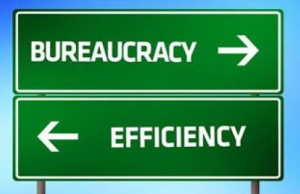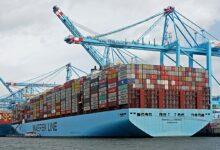
7 Effects of Government Bureaucracy On Business Performance And Survival In Nigeria
In this post, we take a look at the effects of government bureaucracy on business performance in Nigeria. Bureaucracy a system of government in which most of the important decisions are taken by state officials rather than by elected representatives.
Many laws and policies that guide companies are set up by governments. Some laws, such as minimum wage, are mandatory, while other policies can indirectly affect businesses. To adapt to evolving rules and regulations, businesses need to be sufficiently flexible. As states and municipalities have their own set of laws, this is valid not only at the national level but also more locally. Indeed, international treaties are also available that can affect the way businesses operate at these levels.
👉 Relocate to Canada Today!
Live, Study and Work in Canada. No Payment is Required! Hurry Now click here to Apply >> Immigrate to CanadaIn Nigeria, at the level of federal, state and local government, the government develops and implements policies aimed at alleviating and controlling commercial activities, and these policies have a positive impact most of the time. In this article, we are going to address the effects of government bureaucracy on business in Nigeria.
7 Effects of Government Bureaucracy On Business Performance And Survival In Nigeria

Here are some of the effects of government bureaucracy on business performance and survival in Nigeria.
1. Political Stability and Culture in Business Promotion
The political culture of the country will always rely on government policy. Policies developed in a politically stable nation would be different from those developed in an unstable nation. A stable political system will make business-friendly decisions that encourage and attract foreign investors to local businesses. Unstable processes pose problems that undermine the government’s ability to preserve law and order. This affects the business climate negatively.
See Also: Unemployment in Nigeria – Causes, Effects, Solutions
2. Government Taxation and Spending
Governments get money from taxes to invest. Increased investment shows that tax or borrowing has also increased. Investment, especially among entrepreneurs who take the risk of starting and managing companies, would be discouraged by any tax increase. Increased expenditure is also eating into the small savings pool, leaving less money for private investment. The decline in private expenditure decreases the production of goods and services – in turn leading to jobs being lost.
3. Business Cost
The process of starting and registering a company in Nigeria is quite an expensive and lengthy process. SMEs in Nigeria are most struggling, and even existing companies and businesses are also introducing policies such as high import and export dues which affect the cost of doing business, this may be in the form of increasing government tariff levies on raw material imports. As a result, the cost of manufacturing and the price of goods have risen exponentially. Taxation policies also have an immense impact on the cost of doing business. A stable or exponential rise in the tax imposed on an enterprise or corporation affects the cost of production and have the same impact on the cost of goods and services.
Government decisions on credit and loan interest rates are guided by the government’s proposed net expenditure for the fiscal year. Basically, the Monetary Policy Committee sets interest rates in Nigeria. A rise in interest rates contributes to an increase in the cost of doing business and as the cost of borrowing cash becomes higher, the accumulation of loans often leads to a reduction in revenue as consumers reduce the spending rate.
👉 Relocate to Canada Today!
Live, Study and Work in Canada. No Payment is Required! Hurry Now click here to Apply >> Immigrate to CanadaSee Also: Fake News in Nigeria – Causes, Effects and Solutions
4. Changes in Market Environment
Government policies constantly affect the business climate. Fiscal policies such as taxes impact companies by altering the investment proposed by clients. Increased taxes lower the disposable income of customers that are eligible for investment.
Tax-sensitive goods are less in demand when there is a tax rise, as the price of the products rises and the disposable income of customers decreases.
5. Trade Regulations
There are regulations enforced by the government at various levels that are ineffective for some companies to comply with – these regulations will constitute a form of expenditure for business owners. However, certain regulations such as periodic health inspection carried out in companies such as restaurants, hospitals, grocery stores, and if enforced well, contribute greatly to the well-being of customers and continuously boost the owners of such companies.
The goal of trade laws and regulations is to encourage unrestrained competition in an orderly manner among companies. The Nigeria Labour Congress (NLC) also creates and governs trade unions to protect the interests and rights of business owners and employees in every industry in the country.
6. Sectionalism
In Nigeria, the discovery of oil has been a blessing and a curse to others. The revenues of this country’s oil and gas industry generate at least 60% of its annual revenue. It goes without saying that the oil sector is the country’s most lucrative sector and as such, defines the country’s rate of social, political, and particularly economic growth. Sadly, this has also contributed to an over-reliance on oil to support economic growth, contributing to the neglect of other potentially profitable sectors.
With a rapidly growing economy, Nigeria is undeniably one of the most marketable countries in Africa, but most investors are only interested in one sector of the country. The underdevelopment of sectors such as agriculture, construction, manufacturing, trade and services is the result of an over-reliance on the oil industry as the primary source of income.
Despite this decline, the government policies in place appear to benefit the oil industry in order to increase the export rate and in turn, profits are made, and investors are attracted. The government’s export duties and taxes imposed on these major multi-national corporations end up favoring businesses and the government.
See Also: Petroleum Product Adulteration in Nigeria: Causes and Effects
7. Effect on SMEs
With the nation’s unemployment rate increasingly rising, more people go into business on their own than ever before, these self-employed individuals and business owners represent the majority of what is referred to as small and medium-sized companies in the business world. Unfortunately, most of these undertakings never go beyond the start-up process, and while there are many different explanations for this such as lack of preparation, outdated business ideas, lack of funding, government policies, concentrating solely on the role that government policies play in the success or failure of these enterprises is the priority.
Government policies and regulations can promote and improve entrepreneurial activities, unfortunately bureaucratic processes and corruption at all levels, if thoughtfully developed and enforced, prevent the effective implementation of what would have been a fruitful strategy. The honest truth is that the government should do better for this nation’s SMEs. The importance of small and medium-sized enterprises (SMEs) in a developing world such as ours cannot be overstated; they play an important role in creating employment, creating diverse goods and providing multiple services and in general, contributing immensely to economic growth and sustainability.
Similarly, exemptions from taxes and customs duties for a specific sector trigger investments in that sector and can generate growth. A high tax rate on imported goods, for instance, may promote local production of the same goods. A high tax rate for raw materials, on the other hand, hampers domestic production.




